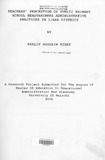| dc.description.abstract | The purpose of this study is to analyze the teachers' perception of primary school headteachers'
management practices.
The management practices selected for the study are time management; leadership practices
decision-making, interpersonal practices, communication practices, delegation and school
administration structure. Headteachers' effective management practices are very essential if
educational goals and objectives are to be realized. Primary school education forms the
foundation from which all other levels of education are build. It is important to ensure that the
management skills of primary school headteachers' will successfully assist them accomplish the
highly responsible task they are called upon to perform. It is believed that the success of, internal
organization and functioning of a school is primarily determined by headteacher's effectiveness
in the school management and teachers' perception of what is desirable.
However, this is not so because from previous research and experience, it IS evident that
headteachers are still in effective in carrying out certain management practices.
The study sought to fulfill four objectives namely:
1. To find out how effective head teachers were m carrying out the school management
practices.
2. To find out whether age, professional qualification and teaching expenence has any
effect on teachers' attitude headteachers' management skills.
3. To find out teachers attitude towards the head teachers' management practices.
4. To identify major problems facing headteachers' in school management.
To realize these objectives a questionnaire was constructed seeking to find out
information that would be used to fulfill the objectives. The questionnaire had three
sections namely:
Section A: Personal data giving information about teachers' age, highest professional
qualification and their teaching experience.
Section B: Was made up of management practice information done thematically. Each
management practice skill had 10 items and the responses were close ended on a fivepoint
linker + scale rating system. The multiple responses were given as strongly agree,
moderately agree, disagree and strongly disagree.
Section C: Was made up of a scale for measuring attitude edited by rammers (1960). The
items in the attitude scale were modified to suit the subject of study.
The study was designed as a survey research. A pilot study was carried out to establish
the validity and reliability of the research instrument. This involved administering the
questioners to 10 randomly selected primary school teachers. Results revealed that the =-
instruments were valid and had reliability co efficient of 0.72. Systematic random
sampling method was used to select a sample size of 61 from population of ,64. The
researcher administered the questionnaires to the respondent who f lied and returned
them the same day administered research instruments personally.
Based on the studies data, the following were key findings of the study. Majority of
headteachers were very effective in leadership, communication and delegations a
management practice skills. Headteachers were fairly effective 111 curriculum and
instruction as a management practice skills while they were in effective in the personal
relationship and decision making management ski lis. Majority of teachers had a
favourable attitude towards headteachers management practices. The teacher's age had a
positive but non-significant with their attitude. This means that teacher's attitude is
influenced by their age at non-significant level. The teacher's highest profession
qualification did not influence teacher's attitude towards the headteachers management
practices. The teachers teaching experience had a negative but non-significant attitude
with the teacher's attitude.
The main problems encountered by the head teachers IJ1 school management practices
identified from the study included, the increasing responsibility of headteachers, lack of
community support for the school due to unhealthy relationships and over enrollment of
pupils. Lack of stability in educational programmes as a result of frequent changes in
policies and also curriculum renovations were mentioned as major problems. They also
identified poor remuneration for head teachers by the government and the effect of
HIV/Aids of pupils and teachers as the major problems. Analysis of these problems
refilled that most of them are related to curriculum and instruction as a management
practice skill.
Drawing from its findings, this study suggested the following recommendations.
Headteachers should be trained further on how to implement and monitor curriculum and
instruction. Headteachers should receive training to help them identify the key areas of
educational interpersonal relationships programme. Headteachers need to be aware of the
prevailing attitude of the teachers towards their practices so that he can be able to
influence the teachers positively as this will lead to improvement of teaching an
learning. The government should provide adequate facilities and finances for the
growing population of schools. Headteachers should seek to develop and maintain open
communication with the community. Where possible headteachers should delegate their
duties to the deputy head teachers and the senior teachers so as to ease their workload. To
motivate them to do their work better there should be a different scheme of service for
them. The ministry of education targeting the school headteachers should organize
frequent workshops, and service under refresher courses on school management. Any
changes in education policy or education curriculum should be done collectively to avoid
its adverse effects of sudden change in the school system.
In summary, the headteachers require more training and in-service courses on how to
effectively carry out the management practices. There is also need to demystify the
concept of management and further clarify the role of the head teachers as this will help
improve the attitude of teachers towards the management practices and create an
environment of mutual trust between themselves and the teachers.
In addition to the above the researcher suggests that a study be carried out in another
place to establish its ability for generalization to all primary schools headteachers in the
country and also to find out whether headteachers effectiveness influence teachers
attitude towards school management. | en_US |

